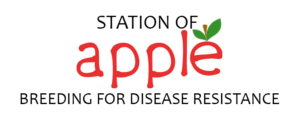In 2016, it was exactly 50 years of existence of our Station which focuses on breeding apple varieties with resistance against apple scab, the most widespread and harmful apple disease, caused by Venturia inaequalis. The common protection against scab requires dozens chemical sprays during vegetation, which is both financially and labor intensive and which can have a negative influence on the environment. Utilization of new apple varieties with both desired growth and economical characteristics and durable resistance substantially decreases the use of fungicides and thus positively influences the environment and consequently increases the profitability of apple trees growth through cost reduction of crop treatment.
Fungus Venturia inaequalis causes symptoms like brown to black spots on leaves and grey-black scabs on fruits; these in turn cause the unsaleability of apples and economic losses for apple growers.
Resistance against scab in the majority of apple varieties is given by a single gene, Rvi6 (formerly known as Vf). The first source of scab resistance was a crab apple Malus floribunda. The gene Rvi6 can be transferred to the progeny simply by crossing and its presence can be proven by means of specific molecular markers. By repeated crossing for many generations, we have managed to combine resistance against diseases with growing/bearing characteristics and fruit qualities to fulfil properties required by growers and consumers.
The monogenic resistance Rvi6 is not stable in nature – in some locations it has already been overcome by new races of the fungus. Our breeding program is therefore focused on searching for new genetic sources of protection against scab by breeding apple varieties with a stable resistance based on polygenic basis in combination with the Rvi6 gene. An efficient use of the polygenic resistance in apple breeding will require developing genetic markers to identify the genes involved using molecular biology methods. As new fungus races will always find ways to adapt and overcome plant defenses, the process of breeding is literally a never-ending work.
Apart from this harmful disease, our research group also partly focuses on tolerance to another fungal disease – powdery mildew, caused by the ascomycete Podosphaera leucotricha, inducing tree damages like whitish coating on leaves and shoots, eventually russeting on fruits which occurs particularly in dry regions.
Apart from disease resistance, new varieties must meet stringent growth requirements in order to be commercially successful. Among these requirements belong growing characteristics, high and regular productivity, good storability and fruit quality, such as appearance, flavour, firmness, crispness and juiciness of the flesh and durability during transport and manipulation. Based on these aspects, our chosen newselections are tested in the Czech Republic as well as in foreign research centers and by potential business partners such as nurseries, producers or marketing companies. Commercially promising newselections are then applied for Community Plant Variety Rights in the EU or for United States Plant Patent in the USA. These varieties are planted predominantly in organic orchards or in integrated production. Their propagation or sales are based on concluded license agreements.
One of the most commercially successful varieties of our program is Topaz and its red mutation Red Topaz. It has been the best-selling European variety with resistance to scab in the last two decades with annual sales more than 400 000 trees. Topaz is very popular amongst organic fruit growers; it is planted mainly in Europe on the area larger than 2 000 ha. Topaz is also very frequently used as a good gene source for further breeding, mainly abroad.
Apart from dessert apple varieties, our program also includes breeding of varieties with a compact columnar growth habit. As a result, the global marketing contract for scab-resistant varieties with this type of growth was concluded with the American company Varieties International LLC for the worldwide territory. Released columnar varieties are legally protected in the EU and in the USA. This type of tree is suitable mainly for home gardens as a beautiful solitaire or for planting in hedges. Columnar apple varieties may contribute to the return of fruit trees to smaller home gardens and allow observation of the individual tree variability at the time of flowering, fruit formation and interesting growth habit. The new, third generation of columnar apple trees from our breeding program was introduced to the market in 2016 and is represented by varieties Lambada and Rumba.
In years 2016 – 2017, the breeding station in Střížovice was modernized thanks to the generous financial support from the Czech Academy of Sciences and the Institute of Experimental Botany CAS. In particular, a new greenhouse and storage rooms were built.
This modern greenhouse with a possibility of the automatic regulation of temperature, light, irrigation and humidity will enhance the choice of newselections with a perspective of stable resistance against scab. It will allow us to sow apple seeds already in January, with the aim to artificially inoculate young seedlings with scab conidia and thus pre-select the most promising resistant individuals before planting them in the orchard. Thanks to this technology it is possible to graft selected seedlings on M9 rootstocks with weak vigor already after one year. This rootstock is characterized with a quick start of crop productivity and thus it shortens the evaluation of a fruit quality for several years.
The Station now also possesses a cooling hall with regulated temperature and ventilation, including ULO technology boxes (Ultra Low Oxygen). The ULO technology slows down the after-harvest fruit ripening by both regulating the temperature and especially by decreasing oxygen content and increasing carbon dioxide concentration in the atmosphere. This new equipment will allow us to precisely evaluate storability of fruits and keep chosen varieties in an excellent condition until spring. It will allow us to consequently present them to our business partners in a great quality and a participation in professional degustation in late terms of apple storage will be possible as well.
New advanced technologies will make the process of breeding faster and more effective.

